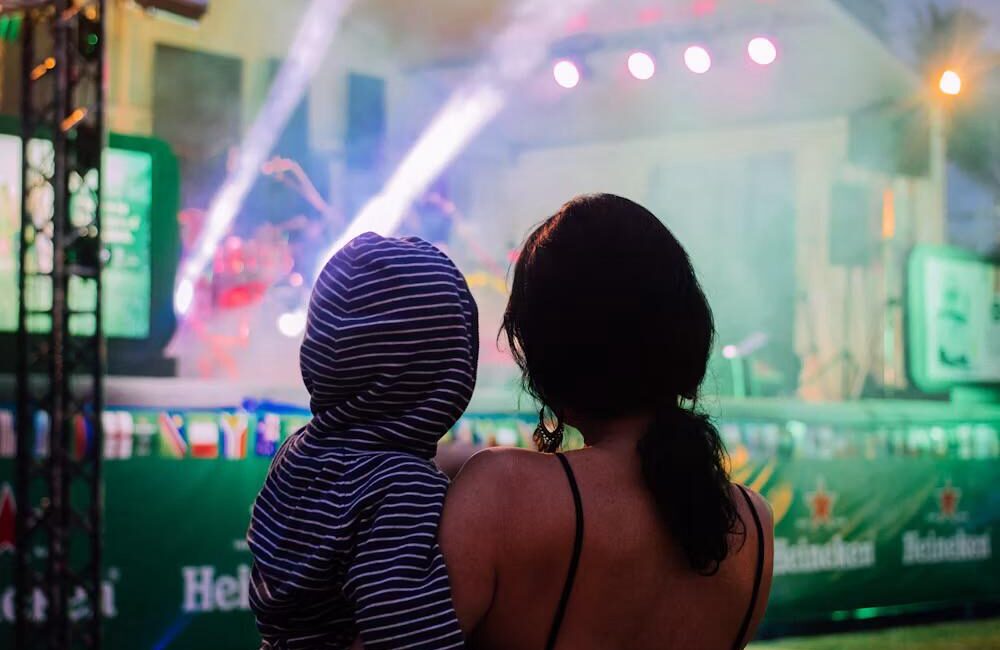
When Children Become Volunteers at the Circus: How to Keep Them Safe
I love modern circus. One of my favorite places to be every summer is at the street theatre and circus festival Za dveřmi, which takes place in Prague’s Holešovická tržnice, that is taking place right now.
I also enjoy attending street theatre festivals abroad, like the one in Caorle.
Children? Most of them love it just as much as I do. It’s beautiful, funny, interesting, engaging—bringing tears, laughter, and a feeling of awe at what human beings are capable of.
But there is one thing I often see at these festivals, both with other children and with my own. And I really want to draw attention to it—for both the attending parents and the amazing artists who make all this magic happen.
Quite often, artists bring volunteers from the audience into their shows. It really does make the show funnier and more interactive in my experience. There is a but. And that but is when children are chosen as volunteers.
Over the years I’ve spent at festivals, I’ve seen too many children get emotionally hurt during performances. Unintentionally. With the artists’ best intentions. They obviously like children, want to engage them, and want to make the show more interactive. All of that is understandable. What they don’t take into account is children’s immaturity.
Children are naturally shy, and their instincts tell them not to interact with strangers. This instinct exists to protect them. The younger the child, the stronger this instinct tends to be. Unaware artists can cause great distress to a child by calling them up on stage—especially without asking. But even when asked personally (as opposed to a general request for volunteers and waiting for a raised hand), children often don’t know they can say no. They feel insecure in unfamiliar situations. Older children may fear ruining the show. One 9-year-old boy was pulled from the audience by two clowns—he didn’t know he could refuse. His mother assumed he would be fine. He cooperated without enthusiasm. At one point, the clowns took him by the arms and legs and swung him through the air. The boy was afraid of any kind of theatre for the next two years.
Even when children volunteer on their own, they are more likely—due to their immaturity—to take things personally. They often don’t understand that a joke isn’t aimed at them. Many jokes can hurt, especially when performed in front of others. I witnessed a girl, around 8 years old, get slightly kicked on the butt by a clown “as a joke.” She had been trying hard to perform a trick she was asked to do, and the clown tried to “help” her this way. She had volunteered on her own but hadn’t expected to be ridiculed in front of the audience. She ran offstage crying.
Small children are not capable of “working.” They might follow a small request without much trouble, but if asked to perform a series of tasks from a complete stranger in front of a large audience, that can place unnecessary strain on their nervous system. I saw an artist call a small girl—maybe 3 years old—on stage, and then ask her to do a series of simple tasks, like jumping from place to place. It wasn’t difficult, and the artist was gentle. It looked cute, and the audience laughed. But for the girl, the experience was clearly very different. Her parents were sitting far away, and she felt insecure. She cooperated. The scene lasted a long time—about 7 to 10 minutes. At the end, the artist gave her a balloon and let her go. She ran to her parents crying. She pushed the balloon away and didn’t want to stay. Why? Because what had happened was a violation of multiple instincts: her natural distrust of strangers, being placed in an extremely vulnerable position on stage, and being expected to “work” and obey instead of being allowed to play—which is where small children feel most at ease.
All these examples are the exact opposite of what circus artists want to achieve. They don’t want to hurt children. They want children to enjoy the show.
So what can be done?
What can artists do?
Recognize that children are not mini-adults. They are more vulnerable, more shy, more insecure. It’s harder for them to say no, harder to “perform,” and they get hurt more easily. Children should be invited on stage only when they explicitly wish to join, and even then, they should be treated with extra care. Their dignity must be preserved at all times.
What can parents do?
Don’t let your child sit alone at the front of the stage while you sit behind. Stay close, providing both psychological and physical safety. Don’t allow artists to pull your child on stage without their explicit consent. Yes—you can physically hold your child back and prevent it if needed.
If these conditions are met, the magic we all want for our children at these wonderful circus festivals can truly happen.
Please forward this article if you know any circus or interactive children’s theatre artists—and also to parents who love going to the circus and theatre with their children.
Author: Lina Vizelman
Photo: Vejesh Datt
